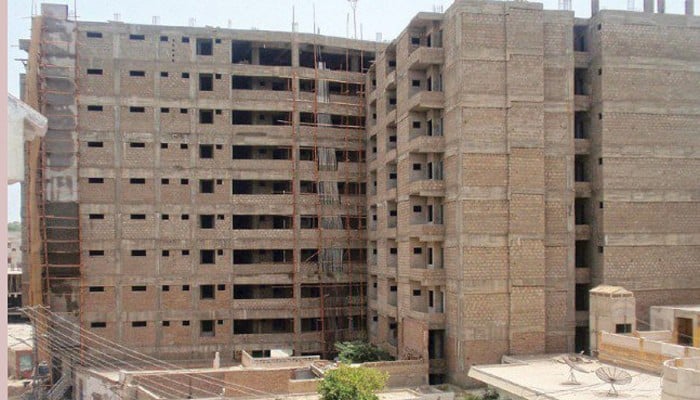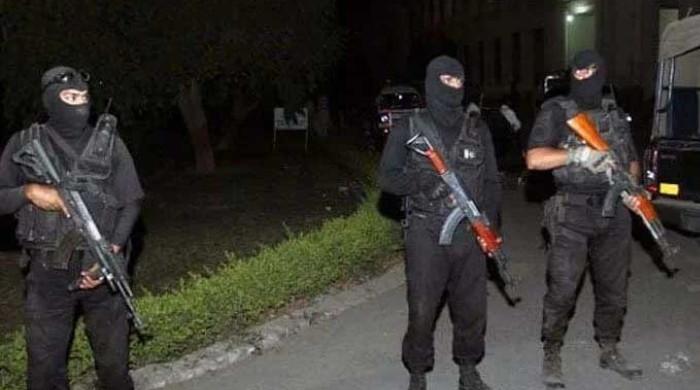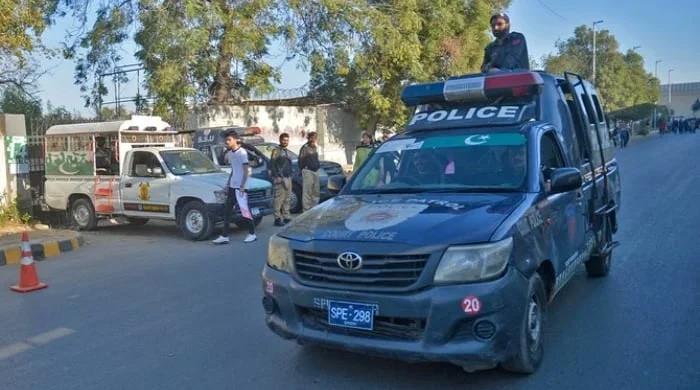CJP vows to end 'tanker mafia', permits six-storey buildings in Karachi
Chief Justice Saqib Nisar hearing substandard packaged milk, environmental pollution, and contaminated water cases in Karachi Registry on Sunday
January 14, 2018
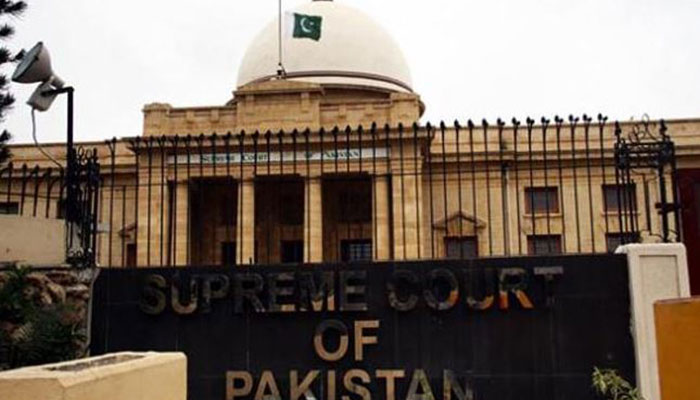
KARACHI: Chief Justice of Pakistan Justice Mian Saqib Nisar remarked on Sunday that a collective effort is required to resolve issues affecting the public.
He made the comments while heading a three-member larger bench, comprising Justices Faisal Arab and Sajjad Ali Shah, that is hearing cases of substandard packaged milk, environmental pollution, and contaminated water.
As the bench began the proceedings, the chief justice remarked that this is a matter of public interest and everyone will have to work together for it.
He also thanked all government officials attending the hearing for coming in on a holiday.
Sindh Chief Secretary Rizwan Memon, Karachi Water and Sewerage Board (KWSB) Managing Director Hashim Raza Zaidi, and Sindh Health Secretary Fazlullah Pechuho, among other officials, attended the hearing.
'Confiscate unhealthy injections used on cows'
The court began hearing the matter of packaged milk first.
As the proceedings began, the court Nazir (official) submitted a report on the matter, which had been summoned the day before.
The chief justice ordered the chief secretary to direct the drug inspector to conduct market raids and confiscate injections used to enhance milk production in cows by infusing hormones.
He also ordered the Federal Investigation Agency and the drug inspector to evaluate the stocks of injection with distributors and retailers.
Tea whiteners are not milk: CJP
During the hearing, representatives of milk companies submitted their response to the court. They stated that milk and tea whiteners are separate things, as tea whiteners are made from milk.
To this, the chief justice remarked that "tea whiteners are not milk in any sense".
"You have to give in writing, through advertisements on TV and print, that this is not milk," he observed and gave the companies four weeks to ensure the warning is printed on packets.
He added that reputable brands are also selling substandard milk.
The chief justice also observed that they will look at the matter of packaged milk first then move on to 'open milk'.
The chief justice also ordered the deputy Nazir to take Rs50,000 from all milk companies and have their product’s tests conducted by Pakistan Council of Scientific and Industrial Research (PCSIR).
The PCSIR was also directed to submit its report in two weeks and directed authorities to lift the entire stock of any company whose milk is found to be substandard.
The hearing was then adjourned.
'Water a need of every household'
Moving on to the environmental pollution case, the chief justice wondered why there is a water shortage in the city. He asked the KWSB chief why water shortage is plugged with the use of tankers.
The KWSB chief replied that there are a number of informal settlements in the city devoid of any water lines.
“Water is a need of every household,” the chief justice remarked.
Justice Shah added that the water lines are broken, due to which the water is wasted.
When the chief justice inquired why there is a water shortage in the posh Defence Housing Authority locality of the city, the KWSB chief stated that the authority manages its own water.
He remarked that it is unfortunate that there is water in Karachi but it is only made available for the rich and powerful.
Will end tankers' mafia in Karachi, vows CJP
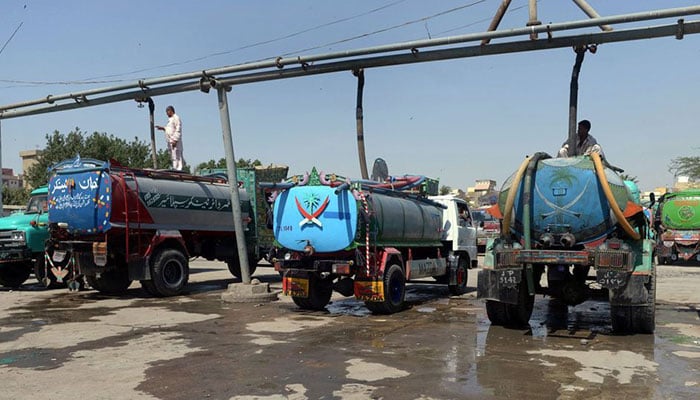
Tankers’ operators have become a mafia, earning billions of rupees, asserted the chief justice, and asked who is behind contracting the tankers.
"If they go on strike we will deal with them, that is our job," he remarked, referring to the tankers’ association.
The chief justice remarked further that the Sindh government is not providing water to citizens.
He also asked the KWSB chief to resign if he cannot fulfil his responsibility.
During the hearing, the chief justice remarked that this is not an ordinary case but a very sensitive matter.
The chief justice ordered the Sindh government to provide security and an office to former Supreme Court Justice Amir Hani Muslim.
The chief justice stated that Justice (retd) Muslim will be given powers of a sitting Supreme Court judge, including contempt powers.
If anyone impedes in the work of the water commission, the court will undertake transfer/postings, the chief justice observed.
"I will end the tanker mafia from this city," said Chief Justice Nisar, adding that the court wants an end to the tanker mafia, whether it takes two months or three.
'You'd never eat chicken again'
"We are here [on a Sunday] for the people of Karachi," Chief Justice Nisar remarked during the hearing, adding that the court will improve Sindh’s situation as it did in Punjab.
Referring to the feed given to chickens at poultry farms, the chief justice said the harmful feed is having an adverse effect on human health.
He added that if one sees the way the chicken feed is made, "you would never eat chicken again".
Mayor outlines city's problems
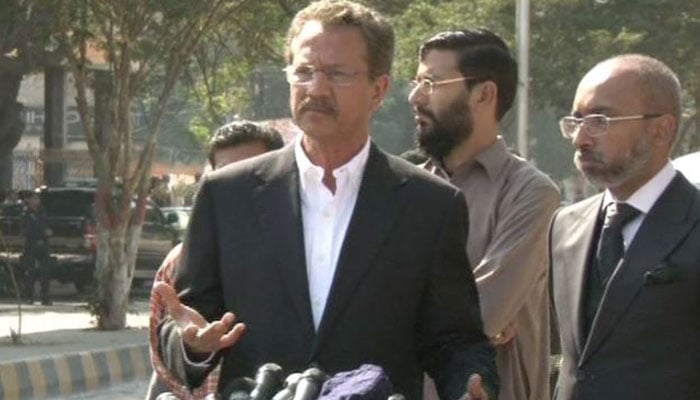
Later, Karachi Mayor Wasim Akhtar appeared in court after being summoned.
Addressing the bench, Akhtar said the city faces several problems, highlighting the city’s rampant illegal electricity connections and issues of the KWSB.
The chief justice responded that these reasons do not absolve Akhtar of his responsibility to resolve the public’s problems.
Demanding remedial measures, the chief justice remarked that Akhtar should present solution when the bench appears here again next week.
“Give us or the water commission your recommendations,” he added.
Akhtar the assured the court of his complete cooperation. The court observed that the issues of the city can be solved with mutual cooperation, adding that the situation will visibly improve in the next three months.
Talking to the media outside the court, Akhtar said it seems Karachi’s problems will soon be resolved.
Six-storey buildings allowed in Karachi
The court then heard the matter of the ban on high-rise buildings in Karachi.
In May 2017, the Supreme Court had stopped the Sindh Building Control Authority and cantonment boards from issuing building approval plans for high-rise and multi-storey residential and commercial structures without the availability of proper water supply and sewerage systems.
Following the order, the builders had filed review petitions in the court.
"When we send one builder to jail the rest will get the message," remarked the chief justice.
The court then allowed builders to construct six-storey buildings, but warned that the prescribed limit should not be breached.
The hearing was later adjourned for a date to be fixed later.
The chief justice then remarked that whenever the need arises, the bench will convene on Sundays.



